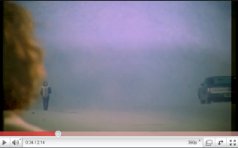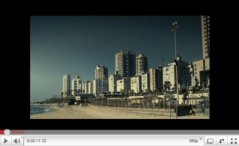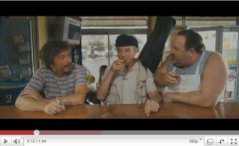Books and Films
Film Reviews
Catch up on the latest film news with Tanya Leslie's summer selection.
Fifty-something Babou is a free-spirited woman whose bohemian existence has often caused shame and embarrassment to her only daughter Esmeralda. To such an extent that she strikes her mother off the list of guests at her forthcoming wedding. Her pride wounded, Babou gets her act together and decides to seek employment. After a series of unsuccessful job interviews, she is hired by an estate agency to sell time-sharing schemes on the Belgian coast. Three cheers for Aura Atika, who delivers a first-rate performance as the public relations officer in charge of training newcomers. Marc Fitoussi's feature serves us a delicious "slice of life" taken from Babou's short stint on Flemish territory. Veteran thespian Isabelle Huppert graces the movie with her customary talent by giving a stunning portrayal in the lead role. Her character is a complex one - fanciful, droll and exasperating but, all in all, utterly endearing. The friendship she forms with a young homeless couple wandering the streets of Ostend is well-drawn and deeply moving. Esmeralda is played by Lolita Chammah, her daughter in real life, who shows remarkable maturity for her young age. Some may point out that the ending is implausible and they may be right but, who cares, Copacabana is an engaging portrait that deserves to be seen.
Tom Dicillo's documentary is an undisguised tribute to the legendary rock band The Doors and their charismatic singer Jim Morrison, who passed away in Paris at the age of twenty-seven. Pieced together with archive material shot between 1966 and 1971, When You're Strange traces the career of the American quartet and their fulgurant ascent to stardom on both sides of the Atlantic. The many black and white concert scenes convey the electrifying atmosphere of their live performances and the strong fascination that Morrison exerted over his audience: strutting on stage in tight-fitting leather pants, he soon became a cult figure of his time, following in the footsteps of Jimi Hendrix and Janis Joplin. His addiction to alcohol and hard drugs was to precipitate his untimely death within a few years. Although the "Lizard King" was unquestionably the leader of the group, the movie devotes footage to the three other musicians Ray Manzarek, John Densmore and Robby Krieger. Regrettably, Dicillo attempts to draw a parallel between The Doors' popularity and the social unrest sweeping America in the late 1960s. As a result, his film is interspersed with newsreel items (Vietnam War, Bobby Kennedy's death, Martin Luther King's assassination) that give it a laboured, academic slant. Another drawback is the narrators' voice over - uninspired and toneless. Clearly, a bad studio day for Johnny Depp! So, not a major production but a curiosity that will undoubtedly appeal to Morrison's many fans.....
Leonid Prudovsky's first Russian feature is a bittersweet tale of unfulfilled love that gets us reaching for our handkerchiefs. Set in the suburbs of Tel-Aviv, it recounts the tender relations that develop between recently-divorced taxi driver Yigal and his son's piano teacher, the ravishing Lina. Her husband is a kidney specialist battling with red tape in Canada, where the couple have applied for a residence permit. As soon as he sets eyes on her, Yigal falls hopelessly in love with Lina, a feeling soon to be reciprocated. Over the following weeks, they meet up on a regular basis at the school or in town, to share a meal or visit an art exhibition. Their romantic friendship is described with elegance and subtlety and magnified by wonderful acting. Even the supporting cast - Yigal's teenage son, his former wife and Lina's husband Grisha - is worthy of note. The title, an allusion to air travel, is a reminder that both characters are "on stand-by". Lina is expecting a letter of confirmation from the Russian Embassy. As for Yigal, he is undergoing therapy to conquer his fear of flying in the hope of attending his son's barmitzva in Paris. Grisha's return and the issue of the long-awaited visa puts an abrupt end to their idyll. A simple, unpretentious story with an underlying streak of humour that skirts the obvious pitfall of sentimentalism.
I highly recommend Pascal Rabaté's first cinematic endeavour, which pays a refreshing tribute to the older generation. French comedian Daniel Prévost is cast as Emile, a pensioner who spends his time patronising the local café or fishing on the banks of the nearby lake with his best mate Edmond. His friend's unexpected death is a hard blow for Emile as well as an opportunity for him to take stock of his life and get things into perspective. Shortly before dying, Edmond confided that he had contacted a singles agency and resumed an active love life. Emile decides to break with his widowerhood and begins dating Lucie, one of Edmond's former girlfriends. Then, seized with a sudden desire for freedom, he takes to the roads in his tiny two-seater and returns to his childhood home. It has been taken over by a bunch of modern-day hippies keen on organic farming. He helps them out with his knowledge of the land and they bring him a breath of fresh air. The two days he spends in their company are one of the most delightful moments in the movie. On his way back home, his path crosses that of Lyse, with whom he discovers the pleasures of courtship. One is struck by the pervading humanity and warm-heartedness of Rabaté's work. He obviously feels a great fondness for his characters, who all come across as unsophisticated but deserving individuals. The title is taken from the French proverb "Les petits ruisseaux font les grandes rivières", meaning "Little brooks make great rivers". This charming fable is guaranteed to lift your spirits and bring a smile to your lips. Its message in a nutshell? It's never too late to be happy....
In a working-class district of Buenos Aires, María del Carmen is celebrating her fiftieth birthday with family and friends. Among the presents left behind by guests is a large box containing a jigsaw puzzle, a novelty for this modest motherly figure. Once María gets started on the puzzle she soon develops a taste for her new hobby. She also turns out to be quite gifted and decides to buy a few more from a shop specialised in parlour games. While she is looking around, her eye catches a small ad for a jigsaw puzzle player. She jots down the number and gets in touch with its author unbeknown to her husband. Wealthy, urbane Roberto is a seasoned player who has become a familiar figure at international events. They decide to meet up twice a week in Roberto's tastefully-furnished flat to prepare for Argentina's annual tournament. During these visits, the two players gradually develop mutual bonds of friendship and respect. The humble, self-effacing housewife gains confidence and her personality begins to blossom. For the first time in her life, her qualities are acknowledged, boosting her self-esteem. The two succeed in winning the national cup and qualify for the final, to be held in Germany three months later. It goes without saying that María will not make the trip to Europe. In her first movie, Natalia Smirnoff has opted for a lucid approach that spares us an unlikely love story. True, our heroine remains faithful to her family but this brief interlude has given her a new lease of life and revived her joie de vivre. This is evidenced by the very last scene, where she is pictured sitting in a field munching an apple with breezy insouciance.....








